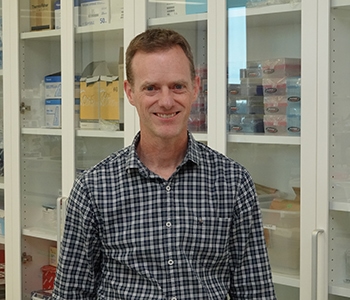
Uncovering new indicators and treatments for triple-negative breast cancer metastasis
Published: 04/30/24 8:28 AM

Philip Gregory
Project Description:
Triple negative breast cancer (TNBC) accounts for around 10-15% of all breast cancer cases and can be difficult to treat. Compared to other breast cancers, TNBC spreads frequently to other organs (known as metastasis) resulting in very poor survival outcomes. A/Prof Philip Gregory and colleagues have previously found that elevated levels of a molecule known as ZCCHC24 correlates with poor outcome in TNBC patients. In this NBCF-funded study the team will examine the role of ZCCHC24 in the metastatic progression of TNBC in laboratory experimental models, and explore the mechanism by which ZCCHC24 reprograms TNBC cells to spread, potentially yielding insights into better treatment options for TNBCs.
Why is this work needed:
Triple negative breast cancer (TNBC) can be difficult to treat and it can spread frequently to other organs (called metastasis). Current therapies for TNBC are chemotherapies, which have toxic side effects, and immune therapies which only benefit small numbers of patients. As a result, the survival rate of women with metastatic TNBCs is very low. There is a need to gain a better understanding of the aggressive features of TNBC cells to develop targeted therapies that can prevent the spread of the cancer and improve the survival outcomes of these patients.
Expected outcomes:
Successful outcomes of this study will reveal whether a molecule, ZCCHC24, can be used as a diagnostic and predictive marker of breast cancer metastasis and could provide valuable insights for improved treatment options for TNBC.
Project description:
Triple negative breast cancer (TNBC) is an aggressive form of cancer most likely to spread beyond the breast (known as metastasis) and return after treatment. It also has a higher prevalence among younger women. TNBC accounts for around 10- 15% of all breast cancer cases and in Australian this is around 3000 new cases of TNBC every year. TNBC is estimated to contribute to about 30% of all breast cancer-related deaths. This can be attributed in part to the absence of effective treatment options. Current therapies mainly involve chemotherapy which comes with toxic sides effects, and immunotherapies that only benefit a small number of patients.
The ability of cancer cells to change and help them spread to other parts of the body, known as cancer cell plasticity, contributes to making cancer harder to treat. Understanding the molecular events that drive cell plasticity could open new treatment opportunities to limit or prevent cancer progression and treatment resistance.
Prior research led by A/Prof Philip Gregory at the University of South Australia identified a protein (ZCCHC24) and showed that elevated levels of this protein cause TNBC cells to become more invasive.
With NBCF support, the team aims to examine a large cohort of samples from previously diagnosed TNBC patients to determine if levels of ZCCHC24 can serve as a diagnostic and predictive indicator of the likelihood of breast cancer to metastasis. Moreover, the team will investigate the molecular mechanism by which ZCCHC24 drive the development of metastatic cancer.
